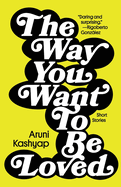
Aruni Kashyap's The Way You Want to Be Loved is a gorgeously spare exploration of the complexities of identity. Kashyap's prose is restrained, expressive, and unflinching, capable of capturing the delicate nuances of human emotion and the brutality of injustice.
The stories in this collection are united by the experience of marginalization, which is reflected in titles such as "Nafisa Ali's Life, Love, and Friendships Before and After the Muslim Ban" and "The Love Lives of People Who Look Like Kal Penn." Kashyap deftly portrays the everyday violence of othering and the subtle and overt ways in which individuals are made to feel excluded, inferior, or forced to confront the challenges of belonging in a world that often seems hostile to their very existence.
Kashyap's writing exhibits a remarkable sensitivity to human suffering. He is able to convey the quiet distress of his characters with unsparing, pessimistic tenderness, as in these lines from "Bizi Colony": "By the time my parents sent me away from Assam to New Delhi for further studies, Bablu had turned into a crackling fire that refused to be doused, demanding to be fed with wood, oil, fat, tears. Each of us took turns to let it feed upon us."
The Indian diaspora is a central subject in Kashyap's work. His stories often feature characters who have been uprooted from their homeland and must navigate living between cultures, revealing the ways in which displacement can shape a person's sense of self and their relationship to the world. The stories in The Way You Want to Be Loved are emotionally devastating, deeply moving, and thought provoking. --Elizabeth DeNoma, executive editor, DeNoma Literary Services, Seattle, Wash.

